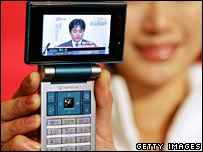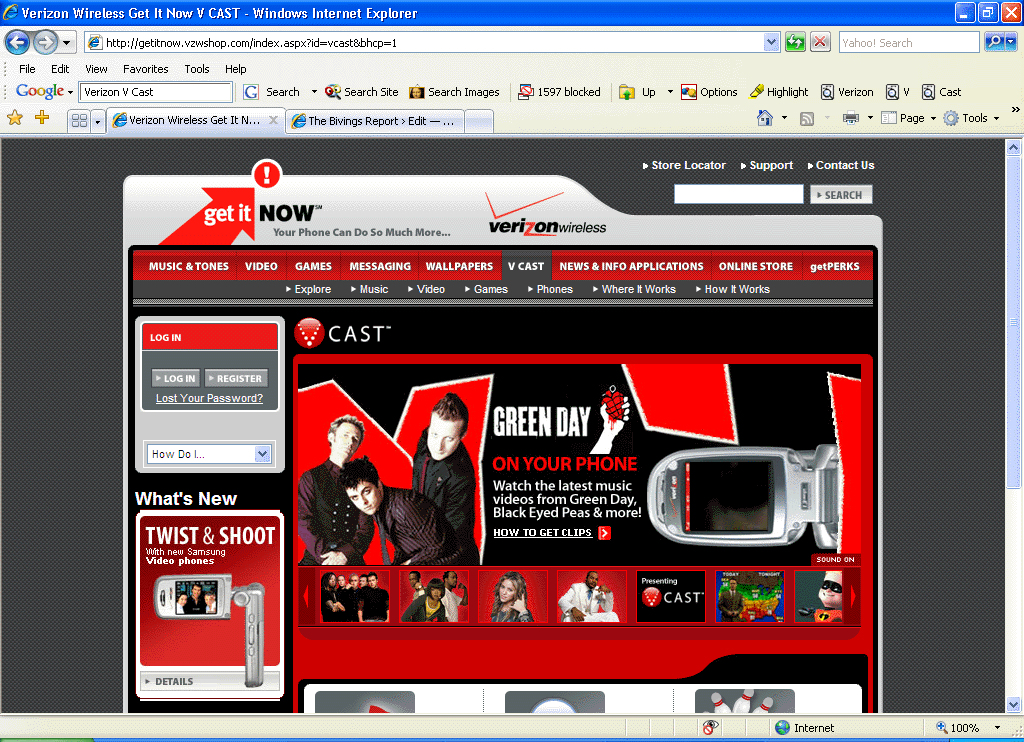Planning on watching the World Cup games the next few weeks? If you are, you better plan on taking some serious vacation time from your day job or moving to a different time zone. For those of you who think those options might be a bit extreme, then just charge up your cell phone.
What can my cell phone possibly have to do with World Cup soccer games?
Well, if you live in Europe or subscribe to MobiTV via your cell phone here in the US, you will be able to catch World Cup action from anywhere.
With few World Cup games being showed during prime time, it will be difficult for American “football” fans to watch the games. ESPN and ABC’s World Cup Coverage consists of mid-afternoon or early AM games, leaving working Americans out in the cold as far as World Cup coverage goes.
Cell phone companies are hoping to remedy this problem by broadcasting World Cup TV  coverage on cell phones with TV capabilities. The BBC reported this week that the World Cup will be a kind of “test” for mobile phone TV, which is expected to truly take off by 2011. Wireless companies around the world are hoping to use the World Cup to spur interest in cell phone TV. A report by Informa Telecoms and Media predicted that a potential $300 million will be earned this summer by wireless companies who offer World Cup TV features to their subscribers. The same report stated that by 2011, there will be some 210 million mobile TV subscribers worldwide, led by Asia with 95 million subscribers. By the 2010 World Cup, one in thirteen cell phone users will own a mobile TV set and be prepared to watch the World Cup on their cell phones.
coverage on cell phones with TV capabilities. The BBC reported this week that the World Cup will be a kind of “test” for mobile phone TV, which is expected to truly take off by 2011. Wireless companies around the world are hoping to use the World Cup to spur interest in cell phone TV. A report by Informa Telecoms and Media predicted that a potential $300 million will be earned this summer by wireless companies who offer World Cup TV features to their subscribers. The same report stated that by 2011, there will be some 210 million mobile TV subscribers worldwide, led by Asia with 95 million subscribers. By the 2010 World Cup, one in thirteen cell phone users will own a mobile TV set and be prepared to watch the World Cup on their cell phones.
For this year’s World Cup, the technology is being led by wireless companies in Germany, where T-Mobile, the mobile arm of Deutsche Telekom, will be offering 20 live matches via cellular service. The UK and Italy will also have significant World Cup mobile TV packages, showing highlights and magazine shows. The US seems a little behind, although T-Mobile and Verizon subscribers will be able to see World Cup highlights on their cell phones. For Spanish speakers, Verizon has teamed up with Univision to offer Spanish language World Cup clips to Verizon wireless V-Cast subscribers.
Spanish speakers, Verizon has teamed up with Univision to offer Spanish language World Cup clips to Verizon wireless V-Cast subscribers.
Is this just another example of World Cup Fever, or is this truly the beginning of a new trend in cell phone use?
Wireless technologies are becoming more and more complex and important worldwide. We have all heard of major wireless advancements occuring in Asia, specifically in Japan, where technology has evolved to make the cell phone, or keitai, the ultimate all-in-one device. Japanese cell phones have the usual perks: take pictures and movies, and play TV and music clips. But the Japanese have taken things a bit further, attempting to replace anything and everything that someone might keep in their wallet with one cellular device. NTT Docomo in Japan allows customers to use their cell phones in place of credit cards and airplane tickets. People with a keitai can even read their favorite comics on their cell phones, or check up on lonely pets staying in “pet hotels”. (And no, I didn’t make that up).
E-ASPAC, an electronic journal of Asian studies has a great article describing the many functions of Japanese cell phones and the extreme penetration by keitai companies throughout the Japanese population.
So it seems that this “test run” by cell phone companies during this year’s World Cup might actually be the tipping point for wireless services worldwide. Cell phones have already cemented themselves as a part of everyday technology, and many cell phone owners consider their wireless devices “too important to lose”. A Nokia survey revealed the following stats about cell phone use :
(Since when did cell phones replace sentimental items? I wonder what people would be more willing to give up: their cell phone, or their soul. I’m just kidding, of course, but I did find that tidbit about the wedding rings pretty amazing.)
It will be interesting to see if the World Cup really actually changes the way Americans use  their cell phones. Historically, Americans have been relatively disinterested in the World Cup, so it would seem logical that the services offered this year would have more of an effect in Europe than here in the states.
their cell phones. Historically, Americans have been relatively disinterested in the World Cup, so it would seem logical that the services offered this year would have more of an effect in Europe than here in the states.
So, what will it be? A move to Germany? Quit your job? Or a simple charge of your cell phone? A trip to Germany would be nice, but I don’t think I can afford that on my grad-student salary. So I guess it will be the last option for me.
Sign up today to have our latest posts delivered straight to your inbox.